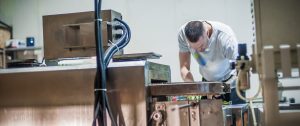Is CNC Machining a Good Career Path?
Jan 31, 2022 There’s been a lot of hype about the demise of manufacturing in the United States. However, the truth is that the manufacture of high-tech and durable products continues to rank among the top five industries powering the U.S. economy. Computer numerical control (CNC) machining has contributed substantially to the health of the manufacturing industry and the national economy as a whole by eliminating the need for tedious calculations and the manual operation of cutting machines. This has led to faster, more efficient production of precision applications for the surgical, aerospace, automotive, and semiconductor industries, to name just a few. With no sign of demand slowing for these products, the outlook is bright for those who stake out a CNC machining career.
There’s been a lot of hype about the demise of manufacturing in the United States. However, the truth is that the manufacture of high-tech and durable products continues to rank among the top five industries powering the U.S. economy. Computer numerical control (CNC) machining has contributed substantially to the health of the manufacturing industry and the national economy as a whole by eliminating the need for tedious calculations and the manual operation of cutting machines. This has led to faster, more efficient production of precision applications for the surgical, aerospace, automotive, and semiconductor industries, to name just a few. With no sign of demand slowing for these products, the outlook is bright for those who stake out a CNC machining career.
Exactly What Is CNC Machining?
CNC technology uses programmed computer software to guide the movement of factory tools and machinery that cut, grind, drill, and shape raw materials like metal and plastic into various components that go into everything from surgical tools to electronics. Also known as precision machining, this industry produces parts that meet exact specifications, so it requires workers with an eye for detail.
What Types of CNC Machining Careers Are Available?
The primary jobs in this field are CNC operator or machinist, tool-and-die maker, and CNC programmer. The U.S. Bureau of Labor Statistics forecasts a 7% increase in demand for these workers over the next 10 years, with approximately 47,500 openings projected each year. Here’s a brief description of the primary positions:
CNC Operators
One of the most appealing aspects of an entry-level CNC operator position is the opportunity for on-the-job training. A high school diploma is typically required, and some companies may also require specialized training through an apprenticeship or vocational program, but willingness to learn is often the chief characteristic needed for a new hire. The entry-level CNC operator usually runs and monitors the equipment in a factory, machine shop, or tool room. Higher-level operators, often called machinists or set-up operators, usually have more advanced training in math, 3D design, and blueprint reading. They program machinery, troubleshoot mechanical breakdowns, interpret blueprints and drawings, and inspect finished products to ensure they meet the customer’s specifications.
Tool-and-Die Makers
These are highly skilled crafters of precision tools and tool holders that are used to cut, shape, form, drill, or stamp metal and other materials. Tool-and-die makers may also perform some of the functions of CNC set-up operators and programmers. They typically have advanced academic training in computer-aided design and manufacturing.
CNC Programmers
A CNC programmer creates the computer program instructions that control CNC machinery. Essentially, this means the programmer must take a drawing or model of a desired component and determine how to instruct a CNC machine to create it. This task requires in-depth knowledge of CNC software programming languages, as well as the capabilities of various types of CNC machinery. Unlike many other computer programming jobs, a CNC programmer does not necessarily have a four-year college degree but often has certification or significant technical training in computer-aided design (CAD) and computer-assisted manufacturing (CAM).
CNC Engineers
CNC machining offers a variety of opportunities for those with specialized engineering skills. In many cases, CNC engineers are responsible for programming, maintaining, repairing, and testing the CNC machines in a shop or manufacturing facility. They may also be tasked with supervisory duties and communicating with customers. Some employers may require CNC engineers to have a four-year degree in mechanical engineering, but others may hire or promote employees to this level if they have CNC programming certification and several years of CNC machining experience.
Demmer Manufacturing is proud to have some of the nation’s leading precision machining and fabrication companies as affiliates in our investment portfolio. If you’re interested in a career in this cutting-edge industry, we invite you to explore our portfolio and each affiliate’s website to learn more about what they do and the career opportunities they may have available.

